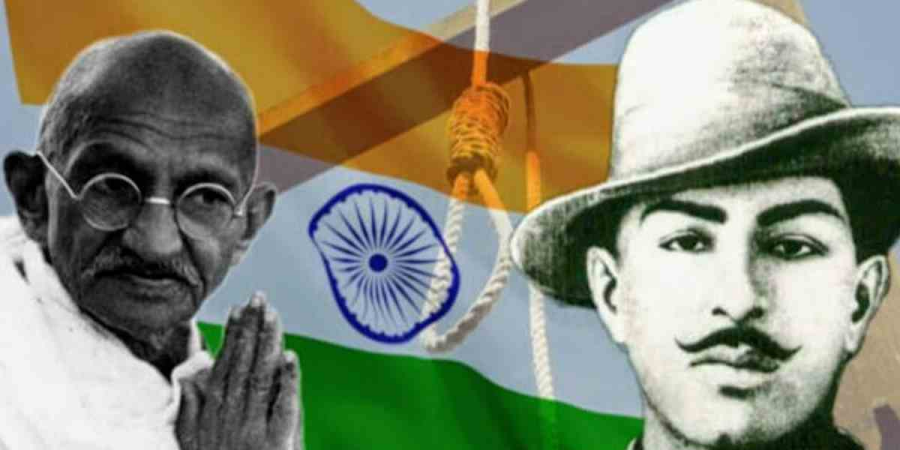

The execution of Bhagat Singh, along with Rajguru and Sukhdev, on March 23, 1931, remains a pivotal and emotional moment in India's freedom struggle. Over the decades, debate has persisted over whether Mahatma Gandhi, the foremost leader of the Indian independence movement, could have prevented their execution. While some argue that Gandhi could have used his influence and negotiations with the British to save Bhagat Singh, others contend that his power was limited. Examining the historical context, ideological differences, and political dynamics of the time provides a nuanced understanding of this question.
Bhagat Singh, a revolutionary leader of the Hindustan Socialist Republican Association (HSRA), became a symbol of youth resistance against colonial rule. His involvement in the assassination of John Saunders (in retaliation for the death of Lala Lajpat Rai) and the bombing of the Central Legislative Assembly led to his arrest and trial in the Lahore Conspiracy Case.
The British colonial authorities sentenced Bhagat Singh, Rajguru, and Sukhdev to death. Their revolutionary ideology and growing popularity among the masses made them a threat to British control, leading the colonial government to use their execution as a deterrent.
In March 1931, around the time of Bhagat Singh's execution, Gandhi was negotiating with Lord Irwin, the Viceroy of India. The resulting Gandhi-Irwin Pact marked a truce between the Congress-led Civil Disobedience Movement and the British government. Gandhi secured the release of several political prisoners as part of the agreement but failed to obtain clemency for Bhagat Singh and his comrades.
This omission led to accusations that Gandhi did not do enough to save Bhagat Singh. Critics argue that Gandhi could have made clemency a precondition for the pact, given his political stature and the strategic importance of Bhagat Singh's case.
Historical records suggest that Gandhi did make efforts to prevent the execution:
Appeals to Lord Irwin: Gandhi appealed directly to Lord Irwin for clemency, arguing that commuting the death sentence to life imprisonment would demonstrate British goodwill and reduce hostility among Indians.
Public Statements: While Gandhi’s ideology of non-violence made it difficult for him to condone Bhagat Singh's revolutionary tactics, he did acknowledge Bhagat Singh’s bravery and patriotism in his writings.
Timing of the Execution: The British advanced the execution date, carrying it out just days before the Congress Session at Karachi. This action suggests that the colonial government was determined to suppress revolutionary sentiment, irrespective of Gandhi’s interventions.
Despite these efforts, Gandhi’s influence was limited by British intransigence and his own commitment to non-violence, which constrained his ability to publicly champion Bhagat Singh's cause.
The differing ideologies of Gandhi and Bhagat Singh also played a significant role in this narrative:
Non-Violence vs. Armed Revolution: Gandhi’s unwavering commitment to non-violence (ahimsa) conflicted with Bhagat Singh’s belief in armed resistance as a means to overthrow colonial rule. This ideological divide made it difficult for Gandhi to fully align with or advocate for Bhagat Singh’s methods.
Strategic Priorities: Gandhi was focused on achieving broader concessions from the British, such as the release of thousands of non-violent political prisoners. The inclusion of a demand for Bhagat Singh’s clemency might have jeopardized the negotiations.
While Gandhi was a powerful leader, his influence over British decisions was not absolute. The British viewed Bhagat Singh as a significant threat and feared that sparing his life would embolden revolutionary movements. Lord Irwin and the colonial administration were unwilling to appear lenient toward someone they deemed a terrorist, despite widespread public protests and petitions for clemency.
Moreover, the Gandhi-Irwin Pact was not a position of strength for Gandhi but a compromise aimed at de-escalating tensions and achieving incremental progress in the independence movement.
Bhagat Singh’s execution sparked outrage and grief across India, galvanizing the freedom struggle. For many, Bhagat Singh became a martyr and a symbol of resistance. Meanwhile, Gandhi’s inability to save him led to criticism, with some accusing him of prioritizing his own non-violent philosophy over the lives of the revolutionaries.
However, Gandhi’s legacy in the freedom struggle lies in his long-term strategy of mass mobilization and non-violent resistance. While he failed to save Bhagat Singh, his approach ultimately contributed to India’s independence.
The question of whether Mahatma Gandhi could have prevented Bhagat Singh’s execution is complex and cannot be answered definitively. Gandhi made efforts to seek clemency but faced limitations due to ideological differences, political constraints, and the British government’s determination to suppress revolutionaries.
Rather than pitting Gandhi and Bhagat Singh against each other, it is essential to recognize their complementary roles in India’s freedom movement. Gandhi’s non-violence and Bhagat Singh’s revolutionary zeal represent two distinct but equally important strategies that contributed to India’s liberation.
